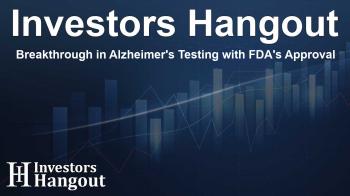Breakthrough in Alzheimer's Testing with FDA's Approval

Advancements in Alzheimer’s Disease Testing
The recent approval of the first blood test for Alzheimer's disease by the FDA marks a transformative moment in the field of diagnostic medicine. This test, which identifies amyloid plaques through a simple blood draw, offers a less invasive alternative to the traditional methods frequently relied upon in the diagnosis of this debilitating condition. This development is expected to significantly enhance the diagnostic landscape for individuals suspected of having Alzheimer's.
Impact of Blood Tests on Diagnosis
Maria C. Carrillo, Ph.D., the chief science officer of the Alzheimer's Association, expressed optimism regarding this advancement, stating that it is a significant step toward simplifying the diagnostic process for American patients. In the past, obtaining an accurate diagnosis could be a lengthy and frustrating experience for many. With this newly cleared test, there is hope that individuals can receive accurate diagnoses more swiftly and efficiently.
The Role of Blood Testing
Blood tests are becoming an increasingly vital part of the diagnostic protocol for Alzheimer's disease. While there currently isn't a single definitive test that can diagnose the disease on its own, the newly approved blood test can complement various other methods such as medical history assessments, neurological evaluations, cognitive assessments, brain scans, and spinal fluid analyses. These combined efforts help clinicians form a holistic view of a patient’s health and treatment eligibility.
Recognizing Biomarkers
The FDA has highlighted that the Lumipulse G pTau217/ß-Amyloid 1-42 Plasma Ratio is specifically designed for adults aged 55 and older who are showing signs of the disease. This test represents a promising new avenue for early detection, potentially ushering a new era of proactive healthcare for those at risk for Alzheimer's. Specialists anticipate that this blood test could serve as a front-line detection tool that leads to further diagnostic processes.
Guidelines for Clinical Practice
In the wake of this approval, the Alzheimer's Association is working on creating clinical practice guidelines aimed at helping healthcare providers navigate the use of blood tests in their diagnostic processes. This initiative will be unveiled at an upcoming conference where specialists will discuss recommendations on who should undergo testing and the optimal timing for such evaluations.
Understanding Patient Perspectives
Recent findings suggest that a significant portion of the American population desires to know their Alzheimer's status; nearly four in five people expressed a wish to be informed about a diagnosis before the disease significantly affects their lives. Additionally, 91% indicated a preference for taking a simple test, like the new blood biomarker test, if it became available. Providing early care and treatment options is the driving force behind such sentiments.
Significance of Continued Research
This latest FDA approval highlights a broader commitment to Alzheimer’s and dementia research, facilitated by substantial funding from organizations such as the National Institutes of Health and the Alzheimer's Association. These resources have empowered scientists and clinical researchers to make strides in understanding the disease, thus paving the way for new diagnostic tools and therapeutic interventions.
About the Alzheimer's Association
The Alzheimer's Association stands at the forefront of global efforts to combat Alzheimer’s disease through research, support, and care advocacy. Our mission is to strive toward a world without Alzheimer's and other dementias, enhancing the quality of life for patients and caregivers alike. For further information, please visit our website or contact our helpline.
Frequently Asked Questions
What is the significance of the new blood test for Alzheimer's?
This blood test provides an easier, less invasive means for diagnosing Alzheimer's disease, potentially allowing earlier and more accurate detection.
How does the test work?
The test detects amyloid plaques in the brain through a blood sample, offering a snapshot that can inform further diagnostic procedures.
Who will benefit from the test?
The test is intended for adults aged 55 and older who are showing symptoms of Alzheimer's disease, helping to identify those who may require further evaluation or treatment.
What role do blood tests play in Alzheimer's diagnosis?
Blood tests complement other diagnostic tools, enhancing the overall accuracy of the diagnosis when used alongside medical history and neurological assessments.
When will the new clinical practice guidelines be available?
The Alzheimer's Association will debut the guidelines at an upcoming conference, offering evidence-based recommendations for health care providers on the use of blood biomarker tests.
About The Author
Contact Olivia Taylor privately here. Or send an email with ATTN: Olivia Taylor as the subject to contact@investorshangout.com.
About Investors Hangout
Investors Hangout is a leading online stock forum for financial discussion and learning, offering a wide range of free tools and resources. It draws in traders of all levels, who exchange market knowledge, investigate trading tactics, and keep an eye on industry developments in real time. Featuring financial articles, stock message boards, quotes, charts, company profiles, and live news updates. Through cooperative learning and a wealth of informational resources, it helps users from novices creating their first portfolios to experts honing their techniques. Join Investors Hangout today: https://investorshangout.com/
The content of this article is based on factual, publicly available information and does not represent legal, financial, or investment advice. Investors Hangout does not offer financial advice, and the author is not a licensed financial advisor. Consult a qualified advisor before making any financial or investment decisions based on this article. This article should not be considered advice to purchase, sell, or hold any securities or other investments. If any of the material provided here is inaccurate, please contact us for corrections.

